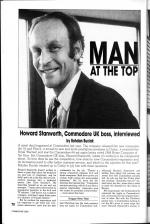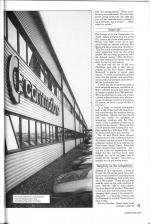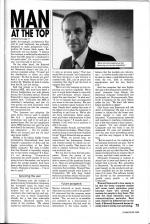
Commodore User
 1st February 1985
1st February 1985
Author: Bohdan Buciak
Published in Commodore User #17
A great deal happened at Commodore last year. The company released two new computers, the C16 and Plus/4. It moved to new and more prestigious premises in Corby, it received the Royal Warrant and saw the Commodore 64 yet again being voted 1984 Home Computer of the Year. But Commodore UK boss Howard Stanworth insists it's nothing to be complacent about. So how does he see the competition, how does he view Commodore's expansion and its increasing need to offer better customer service, and what's in the pipeline for this year? Bohdan Buciak trekked up to Corby to ply him with these questions.
Man At The Top: Howard Stanworth, Commodore UK Boss, Interviewed
Howard Stanworth doesn't profess to know a great deal about the technical ins and outs of computers, and he didn't get to sit in the big chair at Commodore because he's a technical genius (like Clive Sinclair?). He describes himself as an out and out manager: "I spent about seven years in managerial positions in the hi-fi and TV industry. I left that to run a plastics company, and then I spent three years as a directory of Unigate Dairies."
But he reckons his experience and his eagerness to get back into 'consumer electronics' gave him the best credentials for the job. "There's a strong connection between hi-fi and home computers. Both have grown out of their "buff" origins into mass-market industries." But it's more the differences that interest him. "Computers are more exciting; with hi-fi you have a passive relationship, computers give you scope for personal inventiveness" - more about that later.
Happy New Year
Last Christmas saw the cash registers ring out again for Commodore and, although Howard Stanworth will neither brag about that success, nor reveal how well Commodore actually did, he will say that the Corby plant was working "absolutely flat-out" sixteen hours per day, seven days a week to meet the demand for the whole of Europe.
Not surprisingly, the Commodore 64 remained the apple in Commodore's eye, accounting for the largest proportion of sales. But with the Christmas period over, is Commodore looking to cut the C64's price at some stage this year? Howard Stanworth's answer is firm but disappointing: "There won't be any price reductions. You won't see prices going down like last year but you will see manufacturers putting in more features, more power - better value for money."
Sweet 16?
That brings us to the Commodore 16 which, selling at the same price as the Vic, must surely have made people in Britain turn their noses up at that much-loved yet veteran machine. But Stanworth has a surprising revelation: "The Vic is still in production here, but we're producing more for the world market. We won't stop producing until the demand ceases." That should ensure that existing Vic owners won't go short for service and repairs.
But how well did the C16 sell over Christmas, and will it ever be as popular as the Vic? Again, Howard Stanworth is loathe to reveal sales figures: "It made a remarkably spirited entry into the market, and everything we've produced has been sold before it left the production line.
"I think the C16's success has taken a lot of people by surprise, excluding us. Many software houses said there was no longer a market for a 16K machine. We've proved them wrong, and at least a dozen software houses were getting a range of software ready for Christmas. Of course, we have a range of titles of our own."
So it looks as though Stanworth's faith in the C16 has paid off, despite initial criticism that the machine had no new facilities, offered less than the C64 and was really an example of technology standing still. For Stanworth it was a question of what you're getting for the money. "We found that a lot of people were looking for a complete system for a little over £100 - the C16 starter pack gives you just that."
The C16 and Plus/4 have allowed Commodore to offer something both at the bottom and the top end of the home computer market. So how well has the Plus/4 been doing? Again, Stanworth shows characteristic reticence. "All I can say is that our expectations of demand for the machine have been fulfilled, but we've not been able to supply all the demand." And that's a lengthy way of not saying much.
Weighing Up The Competition
Despite all this vagueness, it looks as though the Christmas spoils were split fairly evenly between Commodore and Sinclair, establishing both at the very top of the market. "These two are now seen by users as the right products to have. Nobody likes to think they're buying a dead-end product. They want to be sure that they're buying from a company that's going to be around indefinitely" - a typically cautious way for Stanworth to say that Commodore is here to stay.
But so is Sinclair, always ready to do battle: for example, its Spectrum Plus with its 'real' keyboard, was probably designed to make prospective Commodore 64 buyers think again. But Stanworth was not shaken: "I believe the customer is sufficiently educated to know that £50 extra for a keyboard is not good value". Or, to put it another way, you'd be silly to buy one.
On the other hand, the Amstrad machine does display very good value, but Stanworth doesn't see that as a serious contender either. "It hasn't got the distribution to affect our sales seriously." By that he means you won't find it in as many shops as the Commodore 64. Whether he feels it's better than the C64, he's not saying.
And that brings us to the people backing MSX, who must have spent a fortune bombarding you with adverts during the Christmas period. Howard Stanworth is more prepared to be outspoken here: "Criticisms that MSX is yesterday's technology and that it's overpriced are both absolutely valid and the reports are that the customer has recognised that.
"The Japanese are adopting the same tactics they've used in markets like hi-fi - producing established technology very well to try and get a market share. But I'm not complacent about MSX because you can't be sure what they'll do next year. They're gaining experience - but it's painful. We're not worried now, but we don't take Japan lightly."
Neither is he taking lightly former Commodore International boss Jack Tramiel's acquisition of Atari and his drastic price-cutting of the Atari 800XL computer. But does it bother him that Tramiel is reputedly waging war on his former company? If it does, it's not showing: "Commodore dominates the world market. If you're going to be in the market, you've got to attack the market leaders; he'd have been pretty dump to say he's attacking Coleco. Business is business - I've no axe to grind."
Servicing The User
With Christmas over, the number of people owning Commodore computers has increased again by leaps and bounds. That may be good for Commodore but not so good for its customers who need service and support, an area in which Commodore already has a less than admirable reputation. Stanworth asserts he's aware of the problem. "We almost tripled our sales last year, that's bound to give us growing pains." That may sound like an excuse, but Commodore did have moving to a new location to contend with. Still, can he assure new customers that they'll get the kind of support they need?
"We're not only keeping up but improving our service capability. We're now in much better shape to cope with the post-Christmas service requirements this year than last." In what way? "A lot of changes have accompanied our move to the new factory. We now have a customer repair turnover of 2-3 days. People don't realise that most of the delays occur when the computer is travelling to and from us. We've also got more technicians, better equipment and better administration to deal with those repairs." It sounds good - whether it will work out in practice is still to be seen.
Many people, though, just want help with technical problems. What's Commodore doing to smooth those troubled brows? Again Stanworth has an answer ready. "When we moved here, we restructured the Information Centre and created grades for which our advisors had to qualify. They have to be able to explain technical things in a non-technical way.
"But you have to draw the line somewhere. Given the nature of our business, I don't think we'll ever be able to answer all the questions thrown at us. There are extraordinarily bright users out there - and lots of them." To overcome that problem, Howard Standworth suggests people write direct to Commodore UK with their highly technical problems which will be passed on to the Technical Department.
Future Prospects
Having achieved so much already, what more success is still to be gained? It's rumoured that the company wants more success at the business end of the market. "Yes, we want to re-establish our presence as a front-runner in business computers. But that won't be detrimental to the home market. I beieve that the markets are converging - in twelve months time you won't be able to make a rigid distinction between the two, both in technical specification and the way they're sold."
And the computer that may bridge that gap is the temporarily-named 'Lorraine' computer from Amiga, the American company Commodore has just brought out. Not surprisingly, Stanworth is keeping all the juicy details under his hat. "We don't talk about future products in detail."
One future area Stanworth will take about is Compunet. He sees it as one answer to claims that the home computer market is well and truly saturated. "Communications networks and machine to machine communication is the next reason to buy a micro," he asserts. "I'm very excited about Compunet and the ways it can be enhanced. It's even got potential to give the user more processing power - and that may happen in the long term.
"But for most of us, it's a whole lot of fun because everyone can play. You're not just fed information, it's a community and a method of expression - people can put up what they like. That means Compunet has an organic life of its own, and that's what excites me."
Obviously Compunet is looking to attract lots of users and there is no inherent limit to its size. But, according to Stanworth, "Its success will not depend merely on the products and services available but on the inventiveness of its users. The software market has thrived on the inventiveness of usually young people - so will Compunet."
Howard Stanworth's view seems to be that the home computer market will never reach saturation point because there will always be reasons for people to buy them. This year, the main attraction may be communications networks. Next year, there'll be different bait on the hook. If Howard Stanworth knows already what it will be, he's not telling.
This article was converted to a web page from the following pages of Commodore User #17.




